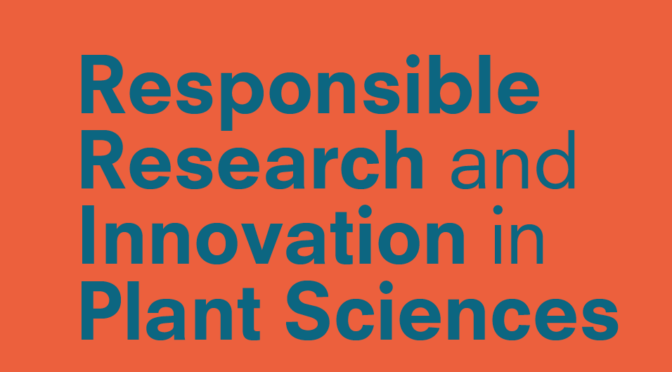Following up the summer school 2018 the PSC published proceedings:
Zurich-Basel Plant Science Center: Proceedings of the PlantHUB Summer School 2018, Responsible Research and Innovation (RRI) in Plant Sciences.
Melanie Paschke (ed.). With contributions by: Manuela Dahinden, Gregory Grin, Melanie Paschke, Christine Rösch, Daan Schuurbiers, Foteini Zampati, Camilo Chiang, Franco Conci, Claudio Cropano, Florian Cueni, Seydina Issa Diop, Daniel Grogg, Manuel Nolte, Ina Schlathölter, Giacomo Potente and Maximilian Vogt.
Social transformation through innovation and research is a key element in the discussion as to how the global community can overcome its complex problems related to environmental and economic constraints in a resource-limited world. Innovation conflicts arise when transformation is mainly technology-driven and does not take up ethical, legal and social issues. In response, scientists are today being asked to play a role in the science-in society dialogue.
The laboratory is in many ways still a protected space, in which (especially young) researchers are effectively shielded from outside pressures by their lab directors (Rip, 2003). The challenge for educational programs that aim to raise the level of attention to RRI issues is, therefore, to demonstrate the added value of social and ethical reflection for the researcher’s own work.
We asked how RRI could allow early-stage researchers to participate in the ongoing public debate on plant breeding and agricultural digitization. The following recommendations were made:
- Scientists are increasingly aware that the so-called ‘deficit model’ of communication, where the decline of public trust in technological innovation is thought to be due to a lack of knowledge on the part of the public – and the resulting solution is hence to educate citizens into acceptance – is deeply flawed. Science can only find solutions to the major societal challenges of our time if it makes people partners in knowledge generation and exchange through processes of participation, and if it includes a correspondingly broad range of voices in decision-making.
- This requires the involvement of scientists in the social debate. Societal debate arises when people’s values, needs and concerns are involved in decision-making. Scientists need to engage with the values of those targeted by their research to be able to anticipate, reflect, deliberate, and respond. This interaction can occur anywhere: in the laboratory, at the design table, or in the policy room; and it can operate at different levels: individually, in a network or community, or within political or institutional systems.
- Scientists must open themselves to the different worldviews and knowledge systems of stakeholders and citizens. In our experience early-stage researchers in natural science need encouragement that this is the right thing to do.
- Citizen participation in science can be a powerful tool: It can bridge the distance between the academic world and society at large. It can be used as a way to generate new solutions that would not be possible without social inquiry. It can serve as a benchmark for the relevance of ideas. These experiences can be used to integrate value-based designs and design thinking in research and innovation.
In our training sessions we regularly ask students what preparation they think is most relevant for carrying out science-insociety dialogue. Most frequently PhD students ask for advicein communicating research in an understandable, meaningful, respectful and honest way to different target audiences. They need practice in facilitating dialogue through open questions. They need insights into methods and tools to stimulate dialogue, deliberation and participation.
Our recommendation is that PhD students in the natural sciences should be allowed to spend 30% of their time in a 48-month fellowship on activities outside research work (= lab time,analysis, and publication). This 30% will include engaging in science-in-society activities and boundary work, training in curricular PhD programs, visiting summer schools, and internships with non-academic partners from the science-society interface or from industry.
Formats for teaching science-in-society methods include summer schools and other recurring workshop types, but also classes within a curricular PhD program.

